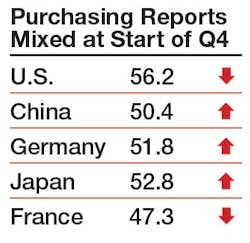Global Manufacturing Offers Mixed Bag in October Purchasing Reports
Manufacturing PMI reports for October indicate continued growth in the US and other major economies, but that growth is coming at a less than vigorous pace in many cases, according to new flash surveys from financial services firm Markit and global bank HSBC.
United States: The U.S. manufacturing PMI fell to 56.2 in October from 57.5 in September. A reading above 50 indicates growth in the sector. The index was the lowest since July and lower than the third quarter average of 57.1. Still, Markit Chief Economist Chris Williamson said it indicates 2014 should finish well for manufacturing.
“Although output growth slowed to the weakest since March, the pace of expansion remains robust,” said Williamson. “Even expanding at this slower rate, the goods producing sector should help drive another solid upturn of the economy in the final quarter of the year.”
New orders dropped in October and survey respondents reported more cautious spending among their clients, particularly with regard to export orders. There was concern weaker orders could impact manufacturers further down the road as economic growth slows in the Eurozone, China and other emerging markets.
Manufacturing employment was a bright spot in the mixed economic picture as job creation continued on par in October from a strong September. Williamson said hiring patterns indicate manufacturers are “generally upbeat about future business prospects.”
China: The HSBC China Manufacturing PMI edged up to 50.4 in October from 50.2 in September. Output, new orders and new export orders all increased in October but at a slower rate. The output index fell from 51.3 in September to 50.7 in October, a five-month low. Indices for both input and output prices fell in the month, noted Hongbin Qu, chief economist for China at HSBC, as “disinflationary pressures intensified.”
“While the manufacturing sector likely stabilized in October,” said Qu, “the economy continues to show signs of insufficient effective demand.” He forecast “more easing measures on both the monetary as well as fiscal fronts in the months ahead.”
Germany: The Germany Manufacturing PMI rose to a three-month high of 51.8 in October from 49.9 in September. The manufacturing output index jumped to 53.3 from 51.0 in September. Manufacturing orders stabilized in October after falling in the previous month.
Hiring in the goods-producing sector was the strongest in nearly three years, Markit reported. And manufacturers reported that their input costs fell in October. However, German firms overall saw the prices they could charge fall in the month, a likely sign of increased competitive pressures and a downward force on profit margins.
Japan: The Markit/JMMA Manufacturing PMI increased to 52.8 in October from 51.7 in September. Observed Amy Brownbill, a Markit economist: “New business rose at the highest rate since February and output remained in modest growth territory for the third month in a row. Furthermore, payroll numbers rose fractionally during the month, following a decline in September.”
France: The news out of France was not good as the manufacturing PMI headed further into contraction, falling from 48.8 in September to 47.3 in October. The manufacturing output index fell 0.8 to 47.6 and the sector shed jobs. Markit reported new business orders declined in manufacturing and new export orders fell at a sharper rate than in September.
Noting that the French economy remained “stuck in reverse,” Jack Kennedy, a senior economist at Markit, said, “Companies scrambled to attract new business by slashing their output prices to the greatest extend in five years, despite a further rise in input costs, underlining the extent of the pressures facing businesses at present.”
While the Eurozone PMI for manufacturing stayed in expansion territory and rose slightly to 51.9 in October, Markit's Williamson warned that the overall Eurozone economy continued to teeter on the brink of a recession.
"Growth is so anemic that increasing numbers of companies are being forced into laying off staff and slashing prices in an attempt to cut costs and boost sales through discounting," he observed.
About the Author
Steve Minter
Steve Minter, Executive Editor
Focus: Leadership, Global Economy, Energy
Call: 216-931-9281
Follow on Twitter: @SgMinterIW
An award-winning editor, Executive Editor Steve Minter covers leadership, global economic and trade issues and energy, tackling subject matter ranging from CEO profiles and leadership theories to economic trends and energy policy. As well, he supervises content development for editorial products including the magazine, IndustryWeek.com, research and information products, and conferences.
Before joining the IW staff, Steve was publisher and editorial director of Penton Media’s EHS Today, where he was instrumental in the development of the Champions of Safety and America’s Safest Companies recognition programs.
Steve received his B.A. in English from Oberlin College. He is married and has two adult children.

